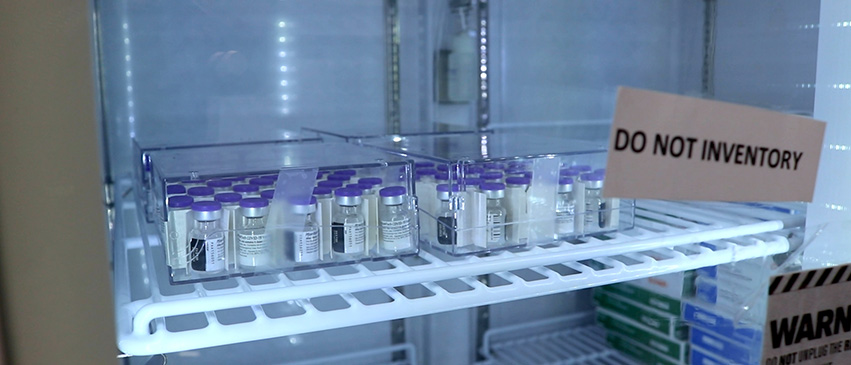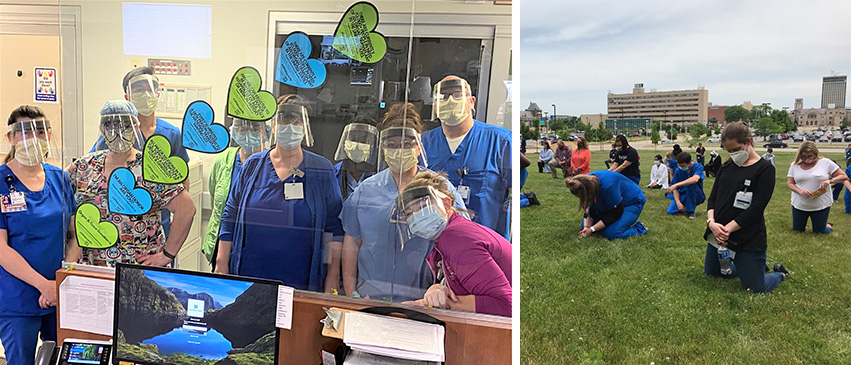
It’s hard to believe this month marks one year since central Illinois health leaders came together to announce our region’s first confirmed case of COVID-19. The virus we’d been hearing of and preparing to fight was now invading our hometowns. As I reflect on all that has happened in the past year—the pandemic, social justice issues and a tense election season, to name a few—I can’t help but think about everything we’ve learned and how we’ve grown.
Community Support
Since March of 2020, our healthcare workers have seen an outpouring of support, both by what our community members have done and what they’ve refrained from doing. Many of our team members were blessed with deliveries of sweet treats and warm meals, which brought a moment of respite during long shifts. Donations of homemade cloth masks were dropped off at UnityPoint Health locations almost too quickly for us to keep up with. Neighbors filled their windows with paper hearts as a message to frontline employees, showing them their work was noticed and unendingly appreciated.
As our region was called to stay at home to stop the spread of this virus, families canceled gatherings and vacations, supported local restaurants by carrying out instead of dining in, and masked up when they had to go out. Those who are able have navigated the new landscape of both working and learning from home. These efforts added a layer of protection for those who couldn’t stay home: the healthcare workers who showed up every day to provide safe care for our loved ones when they needed it.
Prioritizing Safety
For UnityPoint Health, the pandemic has forced us to explore and innovate new avenues of care to prioritize safety. In addition to amplified sanitizing routines, increased PPE usage, and temperature and symptom screenings, we relied heavily on technology to reduce potential exposures. Our clinics established virtual waiting rooms, which helped limit the amount of time patients spent in buildings. For those who didn’t need to see a provider in-person, we greatly expanded telehealth options. Video visits with providers allowed high-quality, face-to-face conversations without requiring time to drive to a clinic.
In addition to growing telehealth for patients’ physical health needs, UnityPoint Health – UnityPlace established options for those impacted by behavioral health conditions and substance abuse. In April, UnityPlace launched its Access Center, which provides resources via phone call or text message. Additionally, telehealth has supported many of UnityPlace’s in-person and group sessions, ensuring those in need of services always have safe access. We’re excited to continue to grow these services for our patients moving forward.

Diversity, Equity and Inclusion
At UnityPoint Health, we are serious about our commitment to diversity, equity and inclusion. We are sobered but resolved as we consider the work still needed. When social justice issues were highlighted after the death of George Floyd in Minneapolis, we knew we couldn’t stay silent. Team members at Methodist, Proctor and Pekin hospitals joined healthcare systems across the country in the White Coats for Black Lives initiative. I felt great humility and pride when I saw team members of all backgrounds come together to express their concern and support.
Continuing our commitment, we secured a screening of Black Men in White Coats during Black History Month. Thousands of employees, students and community members had the chance to stream the new documentary, which examines why the number of Black men applying to medical school has decreased over the past few decades and why it’s important to recruit them into the field through exposure, inspiration and mentoring. We continue our internal efforts to address workforce diversity and unconscious bias, and we are partnering with others in our community to put resources toward addressing health inequities. It is my hope that collectively these initiatives will create a more equitable healthcare system for all.
Vaccine Delivery
I can’t talk about the past year without highlighting a true bright spot for me and the UnityPoint Health team. In the midst of the holiday season, we received a historic delivery to Methodist Medical Center. Our first shipment of COVID-19 vaccines arrived after much anticipation, and we opened our employee vaccine clinic. The line of excited team members stretched across Methodist’s main floor. It was inspiring to see those who have been battling this virus for nearly a year excited to be equipped with the vaccine that would help protect them, their patients and their loved ones.
That excitement spread in mid-January, when the State of Illinois gave us the green light to begin vaccinating patients in Tier 1B. Our team members have now met thousands of grateful patients who have waited months to eat at a restaurant, travel or see their grandchildren. We look forward to meeting more community members who are ready to be part of bringing an end to this virus. UnityPoint Health is committed to supporting the vaccination effort until everyone who wants the vaccine receives one.
Loss and Hardship
As I look back on the past year, I can’t ignore the dark times we’ve endured. My heart goes out to those who have lost loved ones. I empathize with the many individuals and businesses who have experienced severe economic hardship. I worry, as we all do, about the long-term impact on our children, our mental health, and the strength of our connections with each other. But together we have learned, grown and again been reminded what we’re capable of.
Reflecting on the hard work of our team members and other area healthcare systems, I’ve never been more fulfilled and inspired to be part of a healing profession and a healthcare organization. I’m looking forward to brighter days for our community. PM
- Log in to post comments

